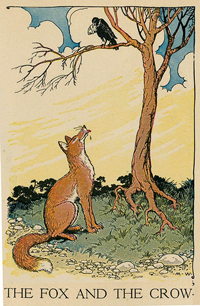
Source: Mintonbluefc2, Minton's Pottery, Wikimedia
Aesop, an ancient Greek slave who lived in 600 BC, is credited with many of the fables that we still read today. He wrote witty, humorous anecdotes primarily about animals with human qualities. The plots are simple, the characters underdeveloped, and the description of the setting minimal. Aesop’s purpose for writing was to convey a thought-provoking life lesson or insight. When reading an Aesop fable, readers don’t have to guess what that life lesson is because it is stated outright, or explicitly, in a moral at end of the tale. Read the following fable about a sly fox and a not-so-sly crow.

Source: aesops fables Milo winter 1919 ill the fox and the crow, janwillemsen, Flickr
The Fox and the Crow
A Fox once saw a Crow fly off with a piece of cheese in its beak and settle on a branch of a tree. "That's for me, as I am a Fox," said Master Reynard, and he walked up to the foot of the tree. "Good-day, Mistress Crow," he cried. "How well you are looking today: how glossy your feathers; how bright your eye. I feel sure your voice must surpass that of other birds, just as your figure does; let me hear but one song from you that I may greet you as the Queen of Birds." The Crow lifted up her head and began to caw her best, but the moment she opened her mouth the piece of cheese fell to the ground, only to be snapped up by Master Fox. "That will do," said he. "That was all I wanted. In exchange for your cheese I will give you a piece of advice for the future: "Do not trust flatterers."
The crow succumbed to the fox’s flattery, opened her beak, and relinquished her cheese. The self-serving fox couldn’t climb the tree and wrestle the prized morsel out of the crow’s beak, so he used flattery to achieve the same end. A number of writers and well known people have been quoted on the subject of flattery. Some of the quotations below are applicable to this fable, but you are to decide which insight best expresses the advice Aesop’s fox shared with the gullible crow.

 Read a few more fables by Aesop from this site. Often the lessons of fables are expressed in proverbs—sayings that express some traditionally held truth. An example of a proverb is, "One good turn deserves another." As you read, find and write one proverb or moral that you think imparts a good lesson. Click on Check Your Understanding to see an example.
Read a few more fables by Aesop from this site. Often the lessons of fables are expressed in proverbs—sayings that express some traditionally held truth. An example of a proverb is, "One good turn deserves another." As you read, find and write one proverb or moral that you think imparts a good lesson. Click on Check Your Understanding to see an example. It is better to bear a single injury in silence than to bring about a thousand by reacting in anger. This is the first of 27 possibilities of morals from this site.